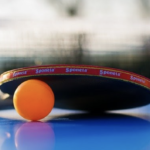There are many reasons to work on your reflexes. Your physical reflexes can help prevent injury, save your life, and help you with daily activities like driving and crossing the street. They can even help you catch expensive falling items like your cell phone.
Your mental reflexes, such as your quick decision-making, can help you avoid danger and make better decisions during high-pressure or even life or death situations. You may not notice, but they might even be able to help you in day-to-day life, such as in school or work.
There are many ways in which you can work on your reflexes. Often, one of the best ways is exercise or sport. One such sport that can help greatly is table tennis.
Why Play Table Tennis?
Table tennis is a sport that provides many physical and mental benefits, but it’s still gentle enough on the body that even older adults can play. It’s a sport that is easy to start and takes little space (compared to other sports, of course). Table tennis is something for the whole family, and even young children can play — provided they’re tall enough, that is.
With all the possible benefits this sport provides, it’s no wonder that many companies have started adding ping pong tables to their employee game rooms. Ping pong tables offer excellent health benefits on top of just being a fun activity that can help players destress and blow off steam.
Let’s take a look at some of the ways ping pong can help your reflexes.
Physical Reflexes
If you want to play a fast-paced and exciting sport, ping pong might just hit the spot. This sport requires you to think and respond at a moment’s notice so you can score or prevent your opponent from scoring. Winning the game depends on your reaction times and how quickly you can coordinate your mind and body to make the actions and plays you want.
The very nature of this sport is exactly what makes it so helpful for improving your reflexes. Here’s how it can do just that:
- Ping pong requires your brain and your body to work well together. Regular play can help improve hand-eye coordination and reflexes, allowing you to make the plays you need to make.
- As you move around, you’ll also be able to improve your balance so you won’t trip or fall when you make a quick movement or correction.
- Ping pong helps develop and improve gross and fine motor skills, making it a great choice for younger children or people recovering from ailments.
Mental Reflexes
Beyond helping your physical reflexes, table tennis can also help your mental reflexes. Here’s how you can benefit mentally:
- As a fast-paced sport, ping pong improves your quick decision-making. The ability to “think fast” can help keep your mind sharp. Some people say it might even help lower the risk of dementia and Alzheimer’s disease.
- Table tennis helps with the mind-body connection, which can help put you more in touch with your body.
The improved ability to make split-second decisions and the quicker reflexes all around can also help keep you safe. It can allow you to make quick corrections to minimize injury to yourself when falling and act quickly to avoid accidents like an oncoming car or falling object.
You Don’t Need to Spend a Ton to Have Fun

Ping pong is a sport for 1-4 people. If you have the right kind of table, you can play it alone by folding one side up so you can bounce the ball back to yourself. However, if you have someone to play with regularly, you can purchase an even more affordable ping pong table.
Just make sure you buy the right table for your intended space — there are different sizes and tabletop thicknesses for various needs. There are even outdoor and indoor tables. Check out some of the best table tennis tables you can buy online today.
Want to unlock greater wellness?
Listen to our friends over at Wellness Force Podcast to unlock your genetic potential with Dr. Ben Lynch:








 How Autoimmune Protocol and Paleo Diet Supplements Improve Your Immunity
How Autoimmune Protocol and Paleo Diet Supplements Improve Your Immunity